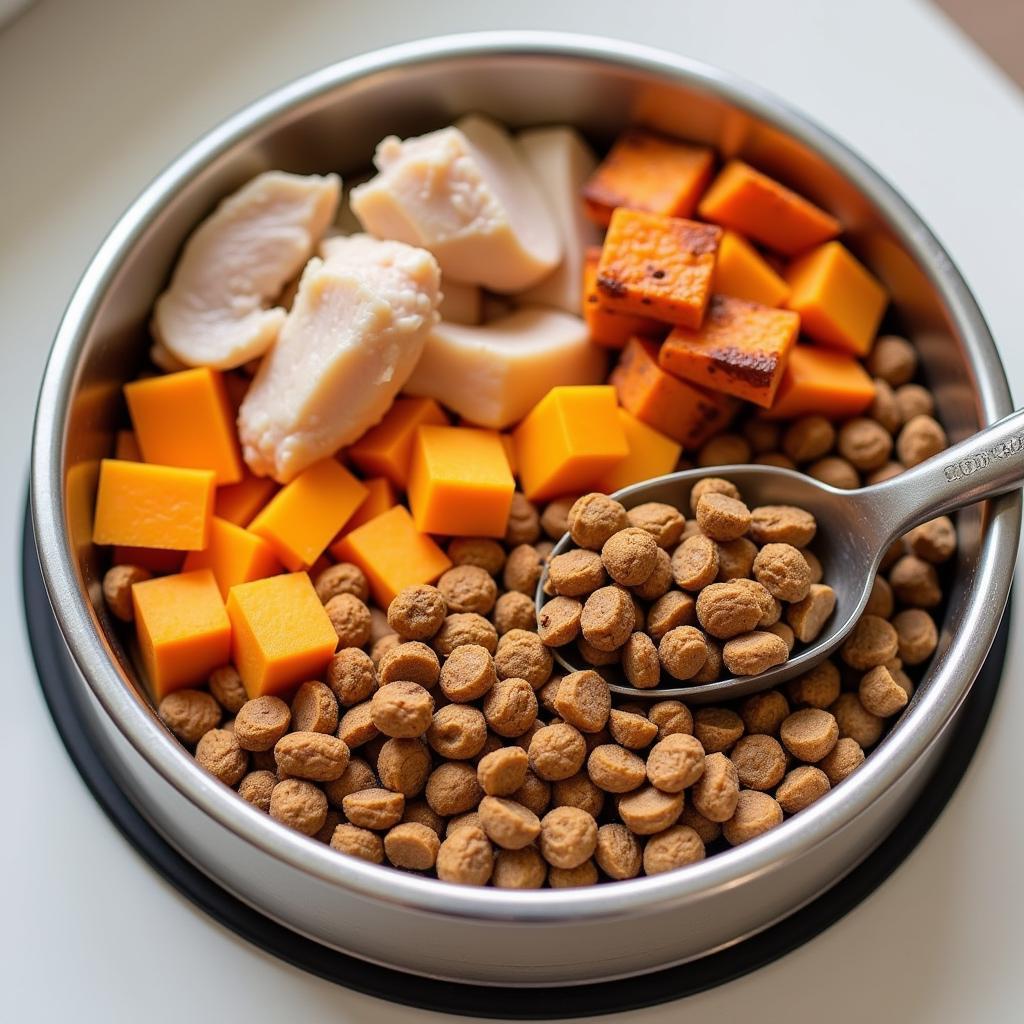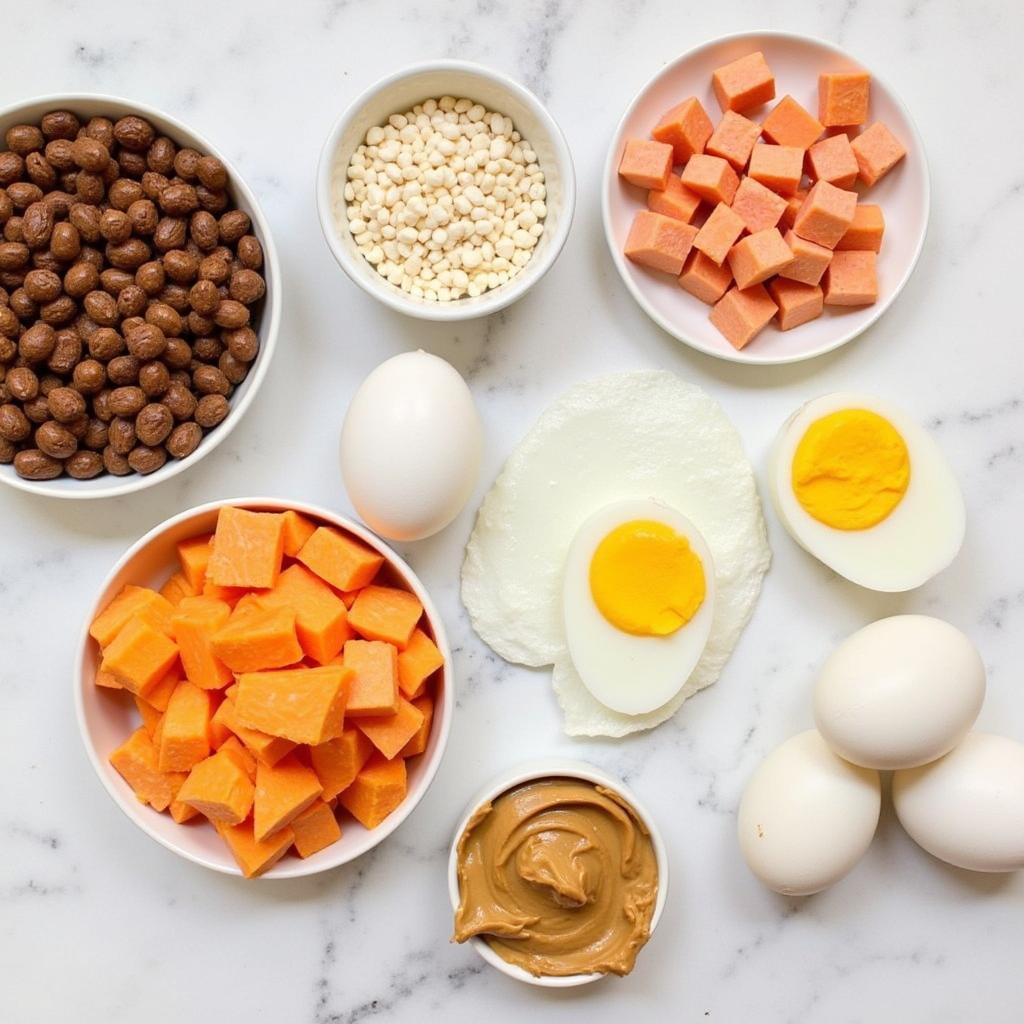Is your furry friend struggling to pack on the pounds? Maybe they’re a picky eater, recovering from an illness, or just naturally lean. Whatever the reason, finding the right Dog Food Toppers For Weight Gain can feel like searching for a needle in a haystack. But don’t worry, we’re here to help!
This comprehensive guide will delve into the world of dog food toppers, exploring the best options to help your canine companion achieve a healthy weight.
Understanding the Need for Weight Gain in Dogs
Before we dive into the world of delicious toppers, it’s crucial to understand why your dog might need help gaining weight. While we adore chubby puppies and often celebrate a dog’s healthy appetite, being underweight can be just as concerning as being overweight.
Some common reasons for weight loss or difficulty gaining weight in dogs include:
- Picky eating: Just like us, some dogs are simply fussy eaters, making it a challenge to get them to consume enough calories.
- Medical conditions: Underlying health issues like parasites, dental problems, or digestive disorders can affect a dog’s appetite and nutrient absorption.
- Stress or anxiety: Changes in environment, routine, or separation anxiety can lead to a decreased appetite.
- High metabolism: Young, active dogs or certain breeds naturally have higher metabolisms, requiring more calories to maintain a healthy weight.
If you’re concerned about your dog’s weight, it’s always best to consult your veterinarian. They can help determine the underlying cause and recommend the most appropriate course of action.
 Dog Food Topper for Weight Gain
Dog Food Topper for Weight Gain
Choosing the Right Dog Food Toppers for Weight Gain
When it comes to selecting the best dog food toppers for weight gain, there are several factors to consider:
- Calorie Density: Look for toppers that pack a punch in terms of calories. Healthy fats, like those found in salmon oil or peanut butter, are excellent choices.
- Protein Content: Protein is essential for building and maintaining muscle mass, which is especially important for underweight dogs. Choose toppers rich in lean protein sources like cooked chicken, fish, or eggs.
- Digestibility: Opt for toppers that are easy on your dog’s stomach, especially if they have a sensitive digestive system.
- Palatability: Let’s face it, the most nutritious topper won’t help if your dog refuses to eat it! Choose ingredients that are appealing to your dog’s taste buds.
The Best Dog Food Toppers for Weight Gain
Ready to tantalize your pup’s taste buds and help them reach a healthy weight? Here’s a list of some of the best dog food toppers for weight gain:
- Cooked Lean Meats: Chicken, turkey, fish (like salmon or sardines), and lean ground beef are excellent sources of protein and healthy fats.
- Eggs: Packed with protein and essential nutrients, eggs are a powerhouse of goodness. Scramble, boil, or cook them lightly for a tasty and nutritious topper.
- Canned Pumpkin: Not only is canned pumpkin a great source of fiber, which aids digestion, but it’s also low in calories and high in moisture, making it a healthy and hydrating topper.
- Sweet Potato: This vibrant orange vegetable is a fantastic source of carbohydrates, fiber, and vitamins, providing sustained energy for your active pup.
- Peanut Butter: A dollop of peanut butter is a delicious and calorie-dense treat. Just make sure to choose unsweetened, xylitol-free peanut butter, as xylitol is toxic to dogs.
- Fish Oil: A supplement rich in omega-3 fatty acids, fish oil not only promotes healthy skin and coat but can also aid in weight gain.
 Healthy Dog Food Toppers
Healthy Dog Food Toppers
Remember to introduce new toppers gradually to avoid upsetting your dog’s stomach. Start with small amounts and monitor their reaction before incorporating them regularly into their diet.
Homemade vs. Commercial Toppers: What’s Right for Your Dog?
The choice between homemade and commercial dog food toppers for weight gain often comes down to personal preference, time constraints, and your dog’s specific needs.
Homemade Toppers:
Pros:
- Fresh and customizable: You have complete control over the ingredients, ensuring they are fresh and tailored to your dog’s dietary needs and preferences.
- Cost-effective: Making your own toppers can be more budget-friendly, especially if you’re using leftovers or readily available ingredients.
Cons:
- Time-consuming: Preparing homemade toppers takes time and effort, which may not be feasible for everyone.
- Nutritional balance: It’s crucial to ensure homemade toppers are nutritionally balanced, providing all the essential vitamins and minerals your dog needs.
Commercial Toppers:
Pros:
- Convenience: Commercial toppers are readily available and require no preparation.
- Nutritional completeness: Many commercial toppers are formulated to be nutritionally complete and balanced.
Cons:
- Cost: Commercial toppers can be more expensive than homemade options.
- Ingredients: Not all commercial toppers are created equal. Some may contain artificial ingredients, preservatives, or fillers that you may want to avoid.
Ultimately, the best approach is to choose what works best for you and your furry friend.
Tips for Success: Making Mealtime Enticing
Getting your dog to eat enough for weight gain can be tricky, but don’t despair! Here are a few tips to make mealtime more enticing:
- Warm it up: Slightly warming up the food can enhance the aroma and make it more appealing.
- Mix it well: Ensure the topper is well-mixed with the regular food so your dog can’t just pick out the tasty bits.
- Be patient: It may take some trial and error to find the perfect combination of toppers that your dog loves.
Conclusion
Helping your dog achieve a healthy weight is a journey that requires patience, understanding, and a sprinkle of culinary creativity. By exploring the world of dog food toppers, you can provide your furry friend with nutritious and delicious meals that support their overall well-being. Remember to consult your veterinarian to rule out any underlying health conditions and determine the appropriate weight gain plan for your beloved companion.
FAQs about Dog Food Toppers for Weight Gain
Q: How much topper should I give my dog?
A: Start with small amounts and gradually increase the portion as needed. Consult your veterinarian for specific recommendations based on your dog’s breed, age, and activity level.
Q: Can I give my dog human food as toppers?
A: While some human foods are safe and healthy for dogs, others can be toxic. Stick to the safe options listed above and always research before introducing any new foods to your dog’s diet.
Q: Are there any specific toppers for puppies?
A: Puppies have different nutritional needs than adult dogs. Consult your veterinarian for recommendations on appropriate toppers to support their growth and development.
Q: What if my dog is still not gaining weight with toppers?
A: If your dog continues to struggle with weight gain, it’s essential to consult your veterinarian. They can perform a thorough examination to rule out any underlying medical conditions and adjust the dietary plan as needed.
For more information on dog nutrition and helpful tips, check out our other articles on best puppy food toppers, good food for staffordshire bull terrier, and no potato dog food.
If you have any further questions or need personalized advice, our team of experts is here to help. Contact us at 02437655121, email us at [email protected], or visit us at 3PGH+8R9, ĐT70A, thôn Trung, Bắc Từ Liêm, Hà Nội, Việt Nam. We’re available 24/7 to assist you with all your pet-related needs.